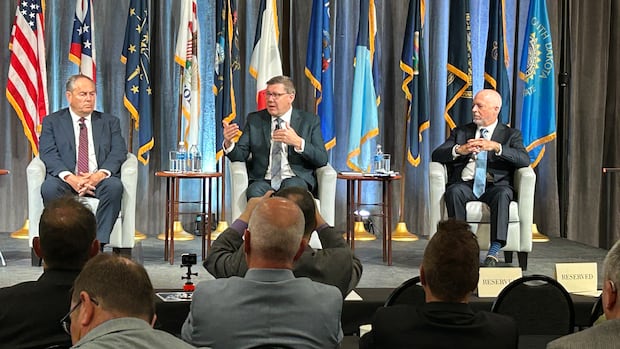Nuclear power is coming to Sask., Premier Moe says at bi-lateral conference
Panel talk with industry executives pitched province's energy producing potential
Nuclear power is coming to Saskatchewan because there is no other option to meet future electricity demands, Premier Scott Moe told a crowd of bi-lateral legislators in Saskatoon.
"We don't have a lot of other choices here, so it is going to be part of Saskatchewan's energy future," Moe said Tuesday in Saskatoon.
Moe and nuclear power industry executives discussed Saskatchewan's energy future and international energy security during a panel talk at this week's Midwest Legislative Conference. Moe was joined by Cameco Corp. CEO Tim Gitzel and Westinghouse Canada President John Gorman.
"It very much is one of the only choices we have moving forward as we shift from other forms of electricity like coal and such to nuclear in the future … and how we're going to provide that reliable, affordable power for decades into the future," Moe said.
The official decision on whether or not SaskPower builds a small modular reactor won't be made until 2029. The province has chosen two potential reactor sites and recently decided to extend the life of SaskPower's coal-fired power plants beyond federally legislated deadlines to shut them down.
Tuesday's panel discussion centred Saskatchewan as a potential energy producing powerhouse with the world's largest deposits of high-grade uranium. Gorman said demand for electricity is driving renewed interest in nuclear power around the world.
"We're going through a global re-emergence of nuclear on a scale that we haven't seen since the 1970s, 1980s, and it's going to be bigger than that," Gorman said during the panel.
"We're projecting that there are going to be 1,000 new reactors built by the time we hit 2050."
Cameco Corp. and Canadian investment firm Brookfield recently purchased Westinghouse, an American company that builds and operates nuclear reactors.
Alberta is now considering adding nuclear power, China is building 10 new reactors and the U.S. decided to extend the life of its reactors by decades.
In 2024, Saskatchewan's uranium exports totalled $2.8 billion, according to the government's most recent annual trade report. The U.S. imported about $1.1 billion of processed uranium from the province that year.
Gitzel said eight of the 11 states at the conference have nuclear reactors and import uranium from Saskatchewan.
"All of you get uranium for your nuclear reactors from us and if you don't want to get it from us, then you're going to Kazakhstan or Russia or China or Namibia," Gitzel said, pitching Saskatchewan-mined uranium as the safest and most responsible choice.
Aug. 1 is the deadline for Canada and the U.S. to sign a new trade deal. President Donald Trump's trade war has put a spotlight on Saskatchewan's major exports and sparked interest in diversifying trade partners to reduce reliance on U.S.
"I fear in the next number of days that it's going to get a little tougher for both of us," Moe said.
"That's unfortunate because it is distracting us from really determining and advancing our own energy security, our own continental security. If we aren't paying attention to that as fellow North Americans, there's other people in the world that are, and I would say that they don't have our best interests in mind."


